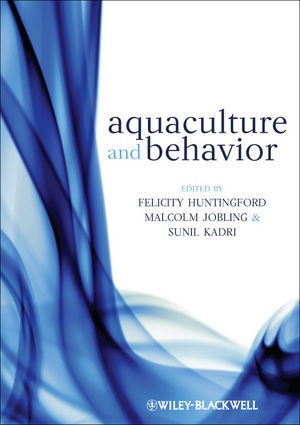Mehr lesen
Informationen zum Autor Felicity Huntingford is Emeritus Professor of Functional Ecology, College of Medical, Veterinary & Life Sciences, University of Glasgow. Malcolm Jobling is Professor of Aquaculture at BFE, University of Tromsø, Norway. Sunil Kadri is an Honorary Research Fellow at the University of Glasgow, UK and Director of OptoSwim Technologies Ltd., UK, Europharma Scotland Ltd. UK & AQ1 Systems Ltd., Australia. Klappentext Modern aquaculture is faced with a number of challenges, including public concern about environmental impacts and the welfare of farmed fish. A fundamental understanding of fish biology is central to finding ways to meet these challenges and is also essential for maintaining the industry's sustainability. Aquaculture & Behavior provides such fundamental understanding with reference to behavioral biology, describing how to avoid problems caused by the natural behavior of farmed fish and providing information that, when properly applied, results in significant benefits for both the fish and the farmer. Written and edited by an authoritative team, Aquaculture & Behavior provides a clear and concise account of aspects of fish biology that are central to aquaculture, gives expert guidance on the behavioral biology of farmed fish and explains how this can be, and is, applied to improve aquaculture practice. Special consideration is given to the role of behavior, why biologists are interested in behavior, and how they study and explain it. The authors focus on the techniques that have been developed for investigating the behavior of fish on farms and the behavior that we require of fish that are cultured for food, for science, for the ornamental trade and for release. The book also discusses and explores the issue of fish welfare and how it can be defined, identified and measured and features strategies for improving the welfare of farmed fish. Informative and engaging, Aquaculture & Behavior brings the reader up-to-date with major issues pertaining to aquaculture. Everyone from fish farmers to upper level students will find this book a valuable and practical resource. Libraries in universities and research establishments where animal behavior, aquaculture, veterinary and biological sciences are studied and taught should have copies of this work on their shelves. Zusammenfassung Summarises the current understanding of the behavioural biology of farmed species and illustrates how this can be applied to improve aquaculture practice. Provides information which, when properly applied, will result in significant economic benefits. Inhaltsverzeichnis Contributors xiii Preface xiv Foreword by V.O. Crampton xvi 1 Introduction: Aquaculture and Behaviour 1 Felicity Huntingford, Sunil Kadri and Malcolm Jobling 1.1 Why behaviour and aquaculture? 1 1.2 About aquaculture 2 1.3 Introducing the spotlight species 7 1.4 About behaviour 14 1.5 Fish welfare 20 1.6 Domestication, captive rearing and behaviour 24 1.6.1 Domestication and captive rearing 24 1.7 Criteria for effective and sustainable fish culture 27 1.8 Structure and content of this book 32 2 Fish in Aquaculture Environments 36 Malcolm Jobling 2.1 Introduction 36 2.2 Locomotion and swimming ability 37 2.3 Sensing environmental stimuli 39 2.4 Internal communication systems 47 2.5 Coping with adverse conditions 52 2.6 Contrasts in life history patterns and reproductive biology 55 2.7 Life history programming 58 2.8 Synopsis 61 3 Tools for Studying the Behaviour of Farmed Fish 65 Marie Laure Bégout, Sunil Kadri, Felicity Huntingford and Børge Damsgård 3.1 Introduction 65 3.2 Describing and measuring behaviour 66 ...
Inhaltsverzeichnis
Contributors xiii
Preface xiv
Foreword by V.O. Crampton xvi
1 Introduction: Aquaculture and Behaviour 1
Felicity Huntingford, Sunil Kadri and Malcolm Jobling
1.1 Why behaviour and aquaculture? 1
1.2 About aquaculture 2
1.3 Introducing the spotlight species 7
1.4 About behaviour 14
1.5 Fish welfare 20
1.6 Domestication, captive rearing and behaviour 24
1.6.1 Domestication and captive rearing 24
1.7 Criteria for effective and sustainable fish culture 27
1.8 Structure and content of this book 32
2 Fish in Aquaculture Environments 36
Malcolm Jobling
2.1 Introduction 36
2.2 Locomotion and swimming ability 37
2.3 Sensing environmental stimuli 39
2.4 Internal communication systems 47
2.5 Coping with adverse conditions 52
2.6 Contrasts in life history patterns and reproductive biology 55
2.7 Life history programming 58
2.8 Synopsis 61
3 Tools for Studying the Behaviour of Farmed Fish 65
Marie Laure Bégout, Sunil Kadri, Felicity Huntingford and Børge Damsgård
3.1 Introduction 65
3.2 Describing and measuring behaviour 66
3.3 What we need to know about the behaviour of farmed fish 67
3.4 Indirect reconstruction of the behaviour of cultured fish 67
3.5 Methods of marking and tagging fish 69
3.6 Direct behavioural observation via video monitoring 71
3.7 Direct behavioural monitoring using electronic tags 74
3.8 Direct behavioural monitoring using echo integration 77
3.9 Measuring feeding behaviour in farmed fish 78
3.10 Synopsis 82
4 Movement and Orientation 87
Felicity Huntingford, William Hunter and Victoria Braithwaite
4.1 Introduction 87
4.2 Mechanisms 89
4.3 Development 93
4.4 Functions 96
4.5 Implications for aquaculture 100
4.6 Synopsis 112
5 Feeding Biology and Foraging 121
Malcolm Jobling, Anders Alanärä, Sunil Kadri and Felicity Huntingford
5.1 Introduction to the feeding biology of fishes 121
5.2 Foraging strategies of wild fish 122
5.3 Mechanisms 124
5.4 Development 129
5.5 Functions 132
5.6 Implications for aquaculture 134
5.7 Synopsis 143
6 Nutrition and Diet Choice 150
David Raubenheimer, Steve Simpson, Javier Sánchez-Vázquez, Felicity Huntingford, Sunil Kadri and Malcolm Jobling
6.1 Introduction to what fish eat 150
6.2 Mechanisms 152
6.3 Development 157
6.4 Functions 161
6.5 Implications for aquaculture 166
6.6 Synopsis 176
7 Appetite and Feed Intake 183
Malcolm Jobling, Anders Alanärä, Chris Noble, Javier Sánchez-Vázquez, Sunil Kadri and Felicity Huntingford
7.1 Introduction 183
7.2 Mechanisms 189
7.3 Development 195
7.4 Functions 198
7.5 Implications for aquaculture 200
7.6 Synopsis 209
8 Avoiding Predators 220
Felicity Huntingford, Susan Coyle and William Hunter
8.1 Introduction 220
8.2 Mechanisms 224
8.3 Development 225
8.4 Functions 229
8.5 Implications for aquaculture 232
8.6 Synopsis 240
9 Fighting and Aggression 248
Børge Damsgård and Felicity Huntingford
9.1 Introduction 248
9.2 Mechanisms 251
9.3 Development 256
9.4 Functions 260
9.5 Implications for aquaculture 263
9.6 Synopsis 277
10 Reproductive Behaviour 286
Ia

